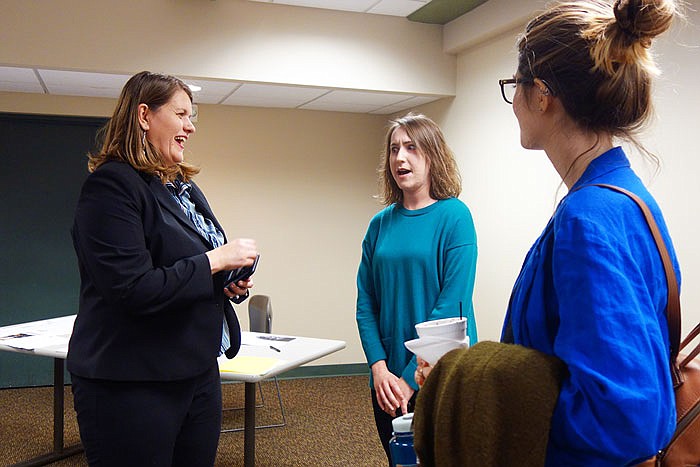When business immigration lawyer Miha Britt looked into the history of immigration and race in the United States, she was surprised to find the two have been heavily intertwined for the last 200 years.
The historical context made her current workload - caring for her clients in the aftermath of President Donald Trump's immigration-related executive orders - seem even more serious, she said during a Tuesday lecture at William Woods University.
"One of the first racially exclusive acts was the Chinese Exclusion Act of 1882," she said.
Targeted at preventing Chinese immigrants from flooding the U.S. during the Gold Rush, the act wasn't repealed until 1943.
Under the National Quota System introduced in 1924, white immigrants were prioritized.
"They were even talking about how Eastern Europeans - like myself, I'm Romanian - were considered an inferior race to Western Europeans," Britt said.
Prioritization of immigrants based on race should have been ended by the Immigration and Naturalization Act of 1965, Britt explained. Instead the current quotas are based on bringing in immigrants who have family already here or are seeking employment.
There is a hitch: Under law; no more than 7 percent of visas issued annually can go to natives of any given country, according to the U.S. Citizenship and Immigration Services.
"For Juan (a Colombian student attending William Woods on a F-1 visa), the delay between him applying for a green card and receiving a response would be about two months," Britt said.
But the delay can be much, much longer for immigrants from larger nations whose residents seek to enter the U.S. at high rates.
"Right now, for immigrants from India, they're currently processing applications from 2005," Britt said. "That's a 12-year delay."
During that time, a would-be immigrant formerly in the U.S. on a non-immigrant visa either would have to find some other way to stay here legally or return to their home country.
"These 'racially neutral' laws have significant racial impacts," she said.
Britt is herself an immigrant. Twenty years ago, she entered the U.S. on an F-1 student visa and studied at Mizzou. She later went on to attend law school and became an immigration lawyer. While she doesn't work directly with undocumented immigrants, she's very aware of the impact Trump's recent orders have had.
The Jan. 25 order about enhancing public safety may have resulted in the arrest of about 600 people during recent raids, Britt said, because it deprioritized going after illegal immigrants who have committed felonies.
"People are being picked up at churches, they're being picked up at schools, they're being picked up at court while they're there paying a traffic fine," Britt said. "You see children waiting at school and their parents aren't coming to pick them up."
While it appears the courts will continue blocking the travel ban on seven Muslim-majority nations and suspending immigration, Britt thinks the executive order will likely be reworked and reissued.

